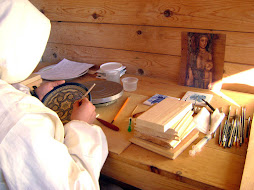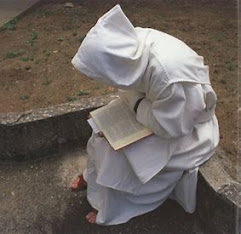Thanks for these follow up questions. I apologize for missing that one question; I'm glad you saw the addendum on the post. (On Being a Hermit Before One Petitions) Though I wish I could refer to conversations on the development of various editions of the canon, those are physically unavailable to me. For this reason I can only list the following reasons: 1) the canon's authors clearly understood solitary eremitical life and stated carefully the essential elements that must come together in a person's life for them to be considered a hermit and then to live this life in the name of the Church; They allowed for (in fact, they required that) the hermit (to) write her own Rule of Life which indicates to me that they clearly saw the way the Holy Spirit worked in this person's life was primary and neither should nor would be subordinated to arbitrary or artificial time frames or unnecessary canonical requirements; 2) commentaries on the canon perceive the life it defines and governs as a second half of life vocation, not as a vocation for a beginner or youngster in the spiritual life. This seems to presuppose at least the kind of formation most hermits experience at the hands of ordinary faithful living and discovery over (relatively) long periods of time. If the individual has been a religious (as in the situation which triggered Bp De Roo's interventions at Vatican II), then that formation would have occurred over years of (usually) perpetual commitment.
3) the eremitical vocation, but especially the solitary eremitical vocation is rare in the Western Church and living it well is demanding; the authors of the canon seemed not to be thinking many people would be approaching dioceses requesting profession and consecration as a canonical hermit. For this reason, they could (and would have) envision(ed) a careful and individualized process of discernment and profession, not one which was regularized from diocese to diocese. The way the canon is written underscores all of this just as does the fact that commentators note that this is to be used for solitary not communal or semi-eremitical vocations; when canon 603 is used for hermits coming together in lauras, each hermit must still write and live her own Rule and move though an individualized discernment and profession process with and under the supervision of the diocese. (I personally believe lauras must be composed of professed c 603 hermits; they are not houses of formation, nor are solitary hermits called to take on such a responsibility for the diocese. On the other hand, I do believe some hermits in the laura may be a resource for those who are responsible for c 603 vocations in the diocese.)
4) because it is about solitary eremitical life, the c 603 vocation is one of the most clearly personal and least externally or canonically structured in the entire scope of religious life. For this reason, it only makes sense that it be maintained in the same way. Semi eremitical institutes of consecrated life will have more externally regularized lives with common Rule, constitutions, and expressions of the Evangelical Counsels, and for this reason will imply greater need for canonical regulation.
Do I accept any time frames?
In general, I accept some temporal guidelines can be helpful, yes. For instance, I generally agree with my former Bishop that no one be admitted to profession (temporary) unless they have lived as a hermit for at least five years. However, in cases where one has lived and been formed in religious life beyond novitiate and hopefully, into perpetual profession, I appreciate discernment and formation may take less time. That is especially true for monastics and those who leave their congregations in order to specifically pursue a vocation to eremitical life. However, in these cases, I also recognize that there is a grieving or transition process that must be negotiated before readiness for profession under c 603; other necessary personal growth may require more time as well. For instance, former religious from active congregations are likely to need to develop as contemplatives before becoming hermits at all, and monastics may need to rethink many of the elements of canon 603 in order to embrace this life in a way which honors both its demands and its freedom. All candidates for c 603 profession will need to find a way to secure themselves materially and financially while being faithful to the nature of eremitical life. This itself is no easy task and it will require some time for the individual and the Church to determine the hermit has secured herself in the way she needs and the canon requires.As noted in earlier posts, the majority of any process of discernment and formation will happen long before a person speaks with her diocese about the use of canon 603 -- usually with the accompaniment of a good spiritual director. Only once the person is actually a hermit in some essential sense does it make real sense to approach one's diocese. After all, one needs the diocese's assistance and participation in a mutual process of discernment about profession and consecration under c 603; dioceses do not form hermits, nor (one hopes) do they profess or consecrate lone individuals who are not yet hermits. The admission of someone to temporary profession is done to allow the person to try their vocation as a solitary hermit in an ecclesial vocation for some years before making a life commitment. During this time the hermit may decide to try eremitical life in a laura or to join a semi-eremitical institute instead, for instance. Still, because people do approach dioceses prematurely, a process of mutual discernment and formation can make sense by focusing on the various Rules of Life the individual writes as her experience of herself and the eremitical life grows. This process can be immensely helpful to the diocese and expedite the process of discernment and formation in terms of focus and assistance or support with resources. Ultimately, it can provide the grounds for determining a candidate's readiness for profession and consecration.
I also accept that a diocese might not be willing to work in this way for more than five years. If that is the case, however, such a diocese should be open to reopening conversation with the individual should the person return in time with greater discernment and formation and still be convinced they have an eremitical vocation. If it is clear to the diocese that the person is unsuitable for profession under c 603 (that is, they are not called to an ecclesial vocation as a solitary hermit), then they should be honest with their findings and carefully explain the reasons to the individual and (if this seems helpful), to her director. I would sincerely hope in such a case that the diocese would help point the candidate in other directions. Equally, I would hope the diocese would be open to educating themselves further on the ways successful hermits under c 603 have lived the life and represented the vocation well. (Discernment and formation need/must not only oblige the hermit or hermit candidate!! But that's another topic!!) Since eremitical vocations take time to develop and reveal themselves clearly, I am not putting any terminal numbers on this idea of returning for periods of mutual discernment with the diocese. What must guide everyone is loving honesty --- humility. It is not loving to drag out a process unnecessarily, nor is it honest or loving to cut someone off prematurely, especially in such an unusual vocation which most diocesan staff must educate themselves in in order to truly understand themselves. (Another reason dioceses tend to take refuge in arbitrary canonical time frames!)**
Lack of Regularity and Structure?
Your concern about a lack of regularity referred I think, to c 603 vocations within a diocese, true? Since such vocations are rare, I think this is not the problem you may be imagining. In any case, I believe the process I have outlined re using the Rule of Life and the task of writing a liveable Rule as a focus of discernment and formation and certainly the canon itself provides sufficient structure for any solitary eremitical vocation. The one place the canon needs to be spelled out a bit is in regard to the phrase "supervision of the bishop". Ordinarily one does not work with (or sometimes, even meet!) the bishop of a diocese in regard to c 603 until the Vicar for Religious recommends one for profession. (This does presume the diocese is open to implementing the canon at all.) Ordinarily, even when a hermit meets annually or bi-annually with her bishop, a delegate is chosen by the hermit to work with her on behalf of the diocese. Sometimes bishops desire more input with regard to the hermit's life and meet one on one with them, and sometimes it will be only the delegate with whom the hermit meets --- it depends upon the bishop. But it is the case that the hermit requires someone besides her spiritual director with whom she may talk frankly regarding her vocation who also serves the diocese and diocesan bishop in this way.** I am always comforted by the fact that though initially disappointing, when I met with my bishop after years of discernment and the Vicar's recommendation that I be professed, he said, "I have not read anything you have written (which included published material on prayer, etc). I wanted to meet you first. I hope this is not too disappointing but (now that we have met) I have a lot to learn before I can give you an answer (regarding profession). We will meet a number of times more." That (then Bishop) Abp. Allen Vigneron took seriously his own need to educate himself and, that he took me seriously as well, is immensely helpful to me. Similarly, I am reminded that when I worked with the diocesan Vicar for Religious in earlier years, Sister Susan and another diocesan official took a long trip to New Camaldoli to speak with the Prior there about hermits, what constituted a healthy eremitical life, etc. (I only learned of this much later!) Understanding a c 603 vocation requires much more education than learning the canonical requirements that apply!!!










































